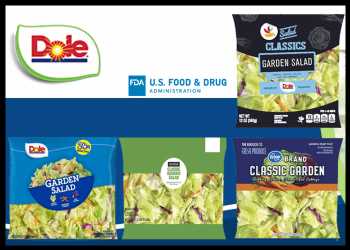Dole Fresh Recalls Garden Classic Salads

Dole Fresh Vegetables, Inc. is recalling a limited number of cases of garden Classic Salads citing a possible health risk from Listeria monocytogenes, the U.S. Food and Drug Administration said.
The products being recalled include 24 oz Dole Garden Salad with lot codes N28205A and N28205B, and UPC Code 0-71430-01136-2; 24 oz Marketside Classic Salad with lot codes N28205A and N28205B and UPC code 6-81131-32895-1; 12 oz Kroger Brand Garden Salad with lot codes N28211A and N28211B and UPC code 0-11110-91036-3; and 12 oz Salad Classics Garden Salad with lot codes N28211A and N28211B and UPC code 6-88267-18443-7.
The best if used by date of all the products are October 25, 2021. The products are beyond its “Best If Used By” date and should no longer be on retail shelves.
The impacted products were distributed in various states of AL, FL, GA, LA, MA, MD, NC, PA, SC, and VA.
The recall was initiated after a single sample of garden salad yielded a positive result for Listeria monocytogenes in a random sample test conducted by the Department of Agriculture in Georgia.
Listeria monocytogenes is an organism that can cause serious and sometimes fatal infections in young children, frail or elderly people, and others with weakened immune systems. Healthy individuals may suffer only short-term symptoms such as high fever, severe headache, stiffness, nausea, abdominal pain and diarrhea. Meanwhile, Listeria infection can cause miscarriages and stillbirths among pregnant women.
However, the Monterey, California -based company has not received any reports of illnesses connected to any of the recalled lot codes to date.
Dole Fresh Vegetables said it is coordinating closely with regulatory officials.
In September, Dole Fresh had called back a limited number of cases of conventional Curly Leaf Parsley citing possible contamination with non-O157 Shiga-Toxin producing E. coli.
The company also recalled Blueberries in June for potential Cyclospora contamination, and Dole Endless Summer Salad Kit in February for undeclared allergens- fish and egg.
Source: Read Full Article
